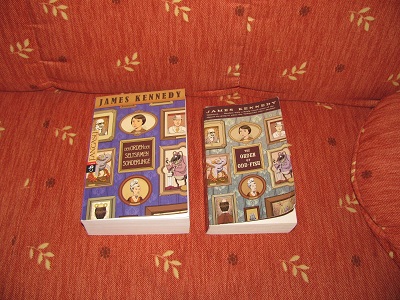Sonderling Sunday – Fumo versus Zam-Zam, the Ritualized Threats
It’s time for Sonderling Sunday! That time of the week when I play with language by looking at the German translation of children’s books. This week it’s back to the Sonderbook that started it all, Der Orden der Seltsamen Sonderlinge, The Order of Odd-Fish, by James Kennedy.
I think of Sonderling Sunday as a very silly phrasebook for travelers. Because it’s too much fun imagining a situation where you could use these phrases if you were a tourist in Germany. And when it comes to using phrases in unusual ways, James Kennedy is a master. I also hope, by the way, that it piques my readers’ curiosity and they are tantalized into picking up the book to find out exactly how these phrases are used.
Last time, we left off on page 260 in the English edition, Seite 330 auf Deutsch.
“Raucous cheers and wild applause.”
= Jubel und wilder Applaus brandeten auf.
“hooted” = johlte
“stragglers” = irgendwelchen Nachzüglern
“cash box” = Geldkassette
Only in a James Kennedy book:
“Fumo, the Sleeping Bee, versus Zam-Zam, the Dancing Ant of Sadness!”
= Fumo, die schlafende Biene, gegen Zam-Zam, die Tanzende Ameise der Traurigkeit!
“boasts” = Schmährede
“armored ostrich” = gepanzerten Strauß
Okay, this is just fun to write out:
“One hundred forty-four thousand, four hundred forty-four”
= Einhundertvierundvierzigtausendvierhundertvierundvierzig
“ritualized threats and insults” = ritualisierte Drohungen und Beleidigungen
“exchange of insults” = Austausch von Beleidigungen
“jiggling antennae” = wippenden Fühlern
“stinger” = Stachel
We lost the alliteration here:
“sleek sheaths of segmented steel” =
eine Rüstung aus unterteilten Stahlplatten
“slumber” = Schlummer
Here’s an interesting sentence, which you probably shouldn’t use if you’re a tourist in Germany:
“When I am finished with you, your body shall be torn asunder by five wild boars and buried in five ignominious places, each one more shameful than the last!”
= Wenn ich mit der fertig bin, wird dein Leichnam von fünf wilden Keilern zerfetzt und an fünf schändlichen Orten verscharrt warden, von denen jeder schmachvoller ist als der andere!
“Bold words!” = Kühne Worte!
“Verily shall I construct honeycombs of your carcass”
= Wahrlich, ich werde Honigwaben um deinen Leichnam errichten
“retorted” = konterte
“ashes of defeat” = der Asche der Niederlage
“contemptuous joy” = verächtlicher Freude
“Vile boaster!” = Schändlicher Prahlhans!
“Quafmaf, the Pigeon of the Moon” = Quafmaf, die Taube des Mondes
“Nixilpilfi, the Gerbil Who Does Not Know Mercy”
= Nixilpilfi, die Wüstenmaus, die keine Gnade kennt
“the realm of obloquy” = Reich der Schmach
“force to your lips the flagon of infamy!”
= die Flasche der Schändlichkeit an deine Lippen zwingen!
While you’re learning all these insults, this is a good response to know:
“Idle threats, Fumo!” = Leere Drohungen, Fumo!
“Mizbiliades, the Bleeding Butterfly”
= Mizbiliades, den blutenden Schmetterling
“Paznarfalasath, the Rhinoceros Whose Laughter Destroys Worlds”
= Paznarfalasath, das Rhinozeros, dessen Lachen Welten zerstört
“Zookoofoomoot, the Maggot of Dismay”
= Zookoofoomoot, die Made der Bestürzung
“Pft the Mouse” = Pft, die Maus
“bed of disgrace” = das Bett der Ehrlosigkeit
“the lullaby of destruction” = das Wiegenlied der Verheerung
Interesting translation:
“a tea ceremony in the Grudge Hut in Snerdsmallow”
= einer Teezeremonie in der Grollhütte in Gimpelgarten
Better know this:
“Consider yourself challenged!”
= Betrachtet Euch als herausgefordert!
“Challenge accepted!” = Herausforderung angenommen!
And another sentence I’d love to find an opportunity to use:
“The lowliest cockroach would spit on you.”
= Selbst die ordinärste Kakerlake würde dich anspucken.
And I’ll finish as the fight finally starts:
“Oh, look, it’s starting!”
= Oh, sieh nur, es geht los!









